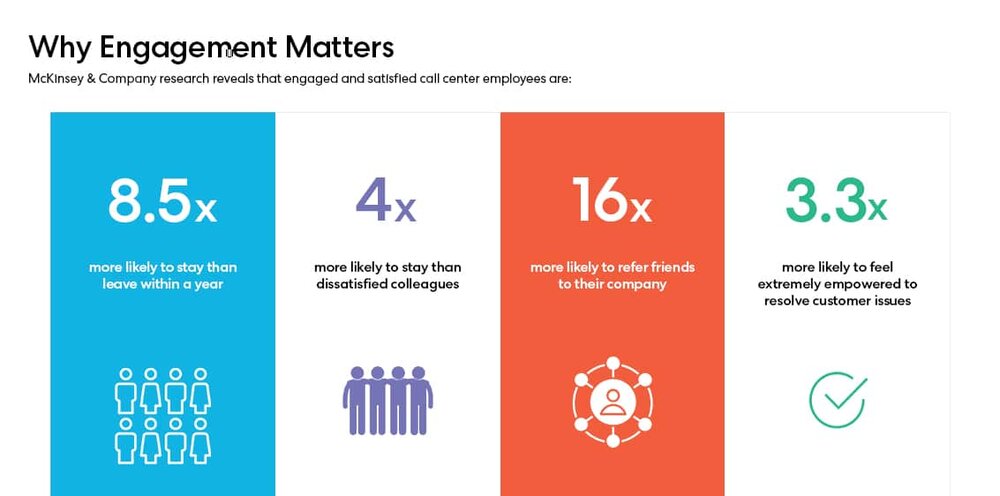Remote work isn't just about making sure your team members have the right technology and security. Keeping your teams engaged is vital. Our SVP, Human Resources Tanya Clark offers her tips for success.
Tanya Clark, Ubiquity
As a next-generation outsourcer with a significant focus on live agent customer support, employee engagement is critically important to our business. Engaged employees perform better and stay with the company longer, both of which translate directly to higher customer satisfaction and loyalty for our clients.
Although many of our leaders work from a variety of locations or travel to different sites as a normal part of their roles, the majority of our workforce traditionally has been onsite in one of our contact centers. Like other businesses, we’ve had to adapt quickly in the face of COVID-19. Remote work is not just about making sure our team members have the right technology and security. Keeping our teams engaged is essential to driving strong performance results.
Navigating the New Normal
Our seasoned team leaders and operations managers have risen to the challenge. That’s because, everything we do starts with our people.
Here are a few tips for navigating remote work. While we expect that some clients will be eager to get back to business as usual with service delivery from our centers, we also expect some to remain in a work-from-home delivery model or a hybrid approach that provides more flexibility and business-continuity benefits.
If you’re considering or already deploying a work-from-home model, keep these best practices in mind for employee engagement.
1. Do Keep it Personal: It can seem more challenging to maintain personal connections when you’re not onsite with your employees every day. As leaders, it’s up to you to set the tone for engagement in this new environment. Seemingly small things like checking in with agents about their weekend, their child’s science project or an upcoming staycation can give you a chance to connect with your team members on a personal level. Personal connections and showing empathy are particularly important right now as employees face new challenges related to the pandemic.
2. Do Use Technology to Your Advantage: Social groups from families to churches to book clubs are finding ways to connect virtually. While it’s important to ensure you’re following your InfoSec policies in terms of which conferencing or chat platforms to use, technology has to be part of your strategy for connecting with remote employees. Whether it’s for one-on-one coaching sessions, weekly team meetings, employee recognition or public squares, email isn’t going to cut it. Picking up the phone as well as enabling video—yes, you’ll need to get dressed—goes a long way. Face-to-face engagement is especially important to keep morale up and ensure that employees feel like you’re keeping them in the loop. Reiterate to employees that help, support and guidance is just one click or call away. Distant doesn’t mean disconnected.

3. Do Build Your Team: Team-building is a mix of art and science, and creativity is key. Our managers have been engaging their teams in daily games, such as puzzles, riddles and trivia. Prizes including gift cards for ordering food and shopping online with local stores are resonating with employees and helping to support local businesses. We’ve also begun performance competitions across our geographic footprint. For example, our work-from-home agents in Pennsylvania are competing with the remote team in El Salvador for bragging rights (in addition to the usual incentives awarded to top performers). As stay-at-home measures are lifted, be sure to engage work-from-home agents in regular events onsite. Once or twice a month, the staff should come together to work from the office, engaging in group coaching sessions and team meals or celebrations. Off-site entertainment and service projects are also effective ways to help build camaraderie and strengthen relationships among your team members.
4. Don’t Micromanage – This is an important tenet in any environment. Contact center employees who feel that their supervisor has them under a constant microscope are more likely to leave, according to a McKinsey & Company survey. If you’re managing your team well, then you’ve given them the tools to succeed and have empowered them to raise their hands if they need help or have an idea on how to make improvements.
Learn more about how Ubiquity’s employee-engagement strategies can help you provide world-class support for your customers
Tanya Clark is the SVP, Human Resources at Ubiquity, where she spearheads all aspects of hiring, developing and rewarding top talent, including benefits and overall employee experience programs across the company’s global footprint. She has more than 25 years of multifaceted human resources expertise.
To provide the best experiences, we use technologies like cookies to store and/or access device information. Consenting to these technologies will enable us to process data such as browsing behavior or unique IDs on this site. Not consenting or withdrawing consent may adversely affect certain features and functions.